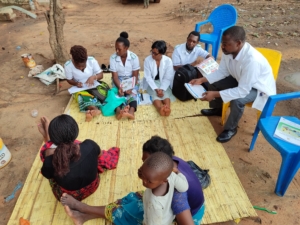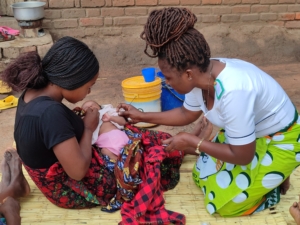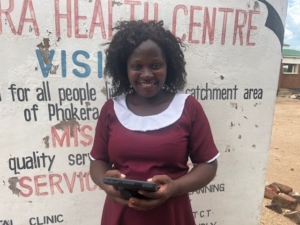By Tasokwa Nkhonjera, Director, Community Health Systems Strengthening, and Mathias Mdalla, Senior Technical Coordinator
In the heart of Malawi’s Nsanje District, Agness Alfonso begins her day well before dawn. As a community midwife assistant, mother, and wife, her mornings are a delicate balance of familial duties and professional responsibilities. By 4:00 am, she is up, preparing her three children for the day ahead. By 7:00 am, she is at Phokera Health Centre, ready for another busy day of work ensuring expecting mothers in her community receive the care they need to safely deliver their babies.
“Growing up, I saw many pregnant women die during pregnancy or childbirth,” Agness recalls. “I always wondered why that was so and dreamed of a day I could help ensure no mother or child dies needlessly.”
She dreamed of becoming a nurse—but after secondary school, financial constraints crushed her hopes of continuing her formal education (a common challenge for many young women in rural Malawi). Without resources to pursue nursing, she settled into life as a wife, mother, and homemaker. But in 2012, a government initiative offering free training for young women aspiring to become community midwife assistants reignited her aspirations. She was heavily pregnant and wondered how she could balance training with caring for a newborn, but her husband’s unwavering support propelled her to apply to the program. “He assured me that if I was selected, he would care for our child while I attended school,” she reflects, acknowledging the rarity of such support among men in her traditional, patriarchal community.

Community midwife assistants and community health workers attend a maternal and child health training.
In Malawi, community midwife assistants are a vital resource for pregnant women and new mothers in rural and remote communities. They work in collaboration with community health workers, who identify pregnant women and refer them to midwives for expert counseling and antenatal, delivery, and postnatal care. Throughout pregnancies and after deliveries, community health workers and midwives work in tandem, with community health workers alerting midwives to high-risk cases and emergencies, and midwives providing technical guidance for follow-up care in the community. Together, they ensure women have access to the care they need—and that this care continues seamlessly and efficiently between the facility and the community at all stages of pregnancy, childbirth, and new motherhood.
Agness was accepted into the community midwife assistant training program, and began studying as a new mother. She developed a wealth of knowledge and skills: how to provide antenatal and postnatal care, counsel expecting mothers, screen for maternal complications, assist with safe deliveries, and deliver newborn interventions such as resuscitation and breastfeeding support. She also learned how to address women’s sexual and reproductive health needs: skills she could use to educate families about contraceptive methods and sexually transmitted infections.

Outside the health center, Agness displays the tablet she uses to access the integrated Community Health Information System, which helps frontline health workers make decisions and track patient data.
After successfully completing her training in 2014, Agness began work at Phokera Health Centre as a community midwife assistant. She was excited to help improve health outcomes for mothers and infants, and worked hard to provide counseling and care, finding pride in her role and seeing her impact as women followed her guidance for healthy pregnancies and safe delivery at the health facility.
But her journey was not without challenges. Male colleagues often dismissed her expertise, and facility leadership undermined her credibility. “I remember when I just joined, my leadership called for a meeting where they told the community I wasn’t a real nurse and shouldn’t be relied upon,” she recalls. She felt pressured to prove her capabilities and qualifications again and again.
Even in the face of these challenges, Agness remained dedicated to her work, continuously seeking opportunities to improve her skills and knowledge. In 2024, she completed training in community-based maternal and newborn care. Developed and conducted by Last Mile Health and Malawi’s Ministry of Health, the training equipped her with advanced skills in antenatal, delivery, postnatal, and newborn care, equipping her to provide more comprehensive antenatal visits, manage safe deliveries, and address complications like hemorrhage and neonatal sepsis. In addition, the training improved her skills in educating women and supporting them to seek facility-based care and delivery, and helped her strengthen her collaboration with the community health workers serving communities near Phokera Health Centre to ensure a continuum of care. “The training enhanced my skills and boosted my confidence,” she says.

Practicing hands-on skills at Last Mile Health’s community-based maternal, newborn, and child health training.
She also gained critical skills in delivering culturally sensitive care, preparing her to address harmful cultural practices head-on and improve health outcomes for mothers and newborns in her community. One such custom involves postpartum mothers sleeping on the floor in separate quarters. Agness has been instrumental in educating families about the importance of safe and hygienic sleeping arrangements for both mother and child, emphasizing the health benefits of proper postnatal care. “Challenging deep-rooted cultural beliefs isn’t easy, but we’re seeing positive changes,” she observes.
Through perseverance and compassion, Agness has earned the community’s trust. Women now seek her counsel on sensitive health issues, from family planning options to postnatal challenges—for their newborns and themselves. She recalls one case of a mother suffering from postpartum depression who faced community ostracism. Through Agness’s intervention, the mother received the support she needed, and the community gained a better understanding of the condition.
As a woman working with women in a community where gender equity remains a distant goal, Agness is an invaluable ally for her patients. Women in Nsanje report that they prefer women health workers, and they feel more comfortable discussing intimate health concerns with women, sharing a deep sense of trust and cultural alignment.
While she works to dismantle cultural norms that harm women in her community, Agness continues to face gender-based systemic barriers in her own professional life. She often finds herself overlooked for training opportunities, with male counterparts receiving preferential treatment. To contest these prejudices, she must go to local leadership or arbitrators—where has been met with additional bias. “The culture here is patriarchal; even male leaders often side with other men,” she shares.
Despite these setbacks, Agness finds purpose and passion in her work. Equipped with stronger skills and knowledge from her recent training, she is determined to help end unnecessary maternal and child deaths—and she knows the women in her community will trust her, seek her out, and follow her guidance, leading to safe pregnancy and delivery. “With the skills I’ve acquired, I believe no mother or newborn should lose their life needlessly,” says Agness.





